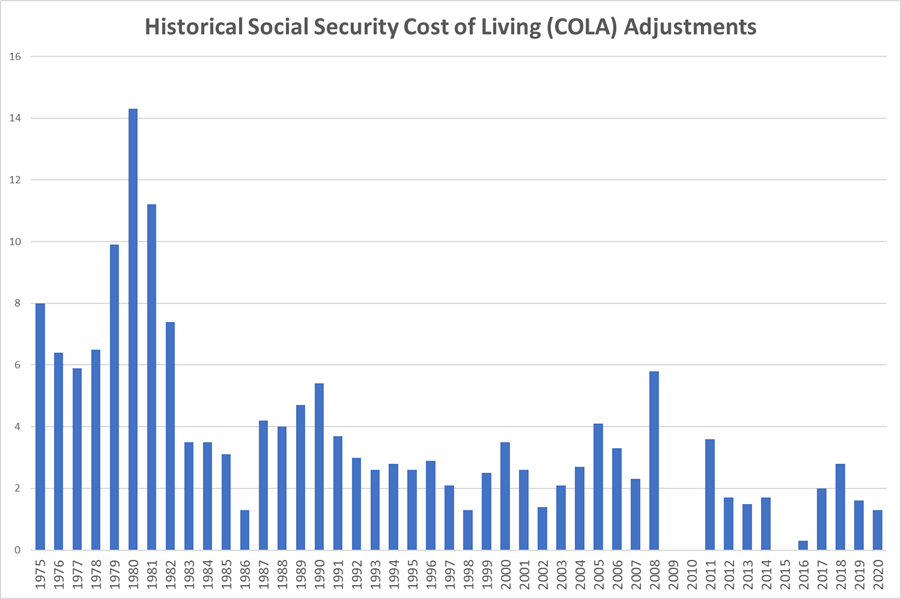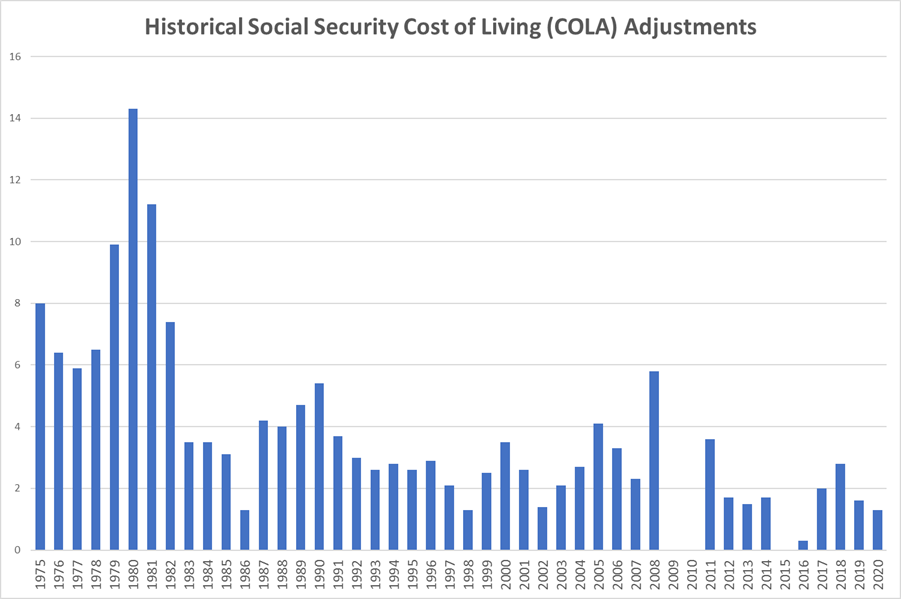How COLA Can Affect Social Security Benefits
November 2, 2020
During 2020, an estimated 65 million people in the United States will receive over one trillion dollars in Social Security benefits, while the average retiree will get a monthly Social Security check of $1,5141.
That is a big financial help for many. Unfortunately, Social Security recipients are not seeing much of an increase in their checks these days. The Social Security Administration uses its official Cost Of Living Adjustment, or COLA, to determine how much these benefits increase each year.
On October 13, 2020, the Social Security Administration announced that Social Security beneficiaries will receive a 1.3% COLA for 2021. For someone receiving the average monthly Social Security benefit amount indicated above, the 2021 COLA results in a $19.68 increase in monthly benefits for next year. Put another way, the 2021 increase in Social Security benefits might be enough to buy you a large pizza every month. It is not very much in dollar terms for the average American.
What is COLA?
The purpose of the COLA is to protect the purchasing power of Social Security benefits from inflation but for many, the actual inflation rate feels much higher than 1.3%. This begs the question; just how does the Social Security Administration determine the annual cost-of-living adjustment?
In this case, they use something known as the CPI-W to determine the COLA. CPI-W refers to the Consumer Price Index for urban wage earners and clerical workers and it is determined annually by the Bureau of Labor Statistics in the Department of Labor.
While better than some years since the financial crisis in 2008-09, the most recently announced COLA for 2021 pales in comparison to those in prior years. The average COLA since 1975 has been 3.6%2: In three recent years (2008, 2009 and 2015), there was no COLA, meaning there was no year-over-year increase in Social Security benefits.

Source: https://www.ssa.gov/oact/cola/colaseries.html
What Does This Mean for You?
Impact of Medicare Part-B Premiums and the Hold Harmless Provision
Social Security recipients are often also enrolled in Medicare. Medicare Part-B premiums are withheld from monthly Social Security benefits and reduce the amount they receive. In 2020 the standard monthly premium for Medicare Part-B enrollees is $144.60, an increase of $9.10 from $135.50 in 20193 or a 6.7% increase, considerably higher in percentage terms than the COLA for that year.
The good news for many is that the government has acted to protect Social Security benefits from the negative impact of increases in Medicare Part-B premiums. The so-called “Hold Harmless” provision ensures the increase in Medicare Part-B premiums will not exceed the COLA for that year. For example, in 2021 the maximum increase in the monthly Medicare Part-B premium will be $19.68, which is the increase in the monthly Social Security benefit due to the COLA.
However, the Hold Harmless rule does not apply to you as a Social Security recipient if:
you are receiving your first year of Medicare benefits, or
if you are in a higher income bracket (defined as individuals earning at least $85,000 and married couples earning more than $174,0004).
Avoid Surprises in Your Retirement
You may be among our clients who are, or expect to be, in higher income brackets during your retirement years, where the Hold Harmless provision may not apply to you.
If this is the case and you are enrolled in both Medicare and Social Security, you could be subject to an additional surcharge on your Medicare premiums, which further reduces your net Social Security benefit. This surcharge known as the Income-Related Monthly Adjustment Amount (IRMAA) is in addition to the “standard” monthly premium for Medicare Plan B cited above, and depending on your income, can be as much as $347 per month higher5.
Sound complicated? It can be a bit complicated, but rest assured we are taking into account these considerations and their impact as we develop and monitor your financial plan.
If you have any questions, please do not hesitate to reach out to your wealth manager.
1https://www.ssa.gov/news/press/factsheets/basicfact-alt.pdf
2https://www.ssa.gov/oact/cola/colaseries.html
3https://www.medicare.gov/your-medicare-costs/part-b-costs
4https://www.ssa.gov/forms/ssa-44-ext.pdf
5https://www.ssa.gov/forms/ssa-44-ext.pdf
Modera Wealth Management, LLC (“Modera”) is an SEC registered investment adviser. SEC registration does not imply any level of skill or training. Modera may only transact business in those states in which it is notice filed or qualifies for an exemption or exclusion from notice filing requirements. For information pertaining to Modera’s registration status, its fees and services please contact Modera or refer to the Investment Adviser Public Disclosure Web site (www.adviserinfo.sec.gov) for a copy of our Disclosure Brochure which appears as Part 2A of Form ADV. Please read the Disclosure Brochure carefully before you invest or send money.
This article is limited to the dissemination of general information about Modera’s investment advisory and financial planning services that is not suitable for everyone. Nothing herein should be interpreted or construed as investment advice nor as legal, tax or accounting advice nor as personalized financial planning, tax planning or wealth management advice. For legal, tax and accounting-related matters, we recommend you seek the advice of a qualified attorney or accountant. This article is not a substitute for personalized investment or financial planning from Modera. There is no guarantee that the views and opinions expressed herein will come to pass, and the information herein should not be considered a solicitation to engage in a particular investment or financial planning strategy. The statements and opinions expressed in this article are subject to change without notice based on changes in the law and other conditions.
Investing in the markets involves gains and losses and may not be suitable for all investors. Information herein is subject to change without notice and should not be considered a solicitation to buy or sell any security or to engage in a particular investment or financial planning strategy. Individual client asset allocations and investment strategies differ based on varying degrees of diversification and other factors. Diversification does not guarantee a profit or guarantee against a loss.
Certified Financial Planner Board of Standards, Inc. (CFP Board) owns the certification marks CFP®, CERTIFIED FINANCIAL PLANNER™, and CFP® (with plaque design) in the United States, which it authorizes use of by individuals who successfully complete CFP Board’s initial and ongoing certification requirements.
